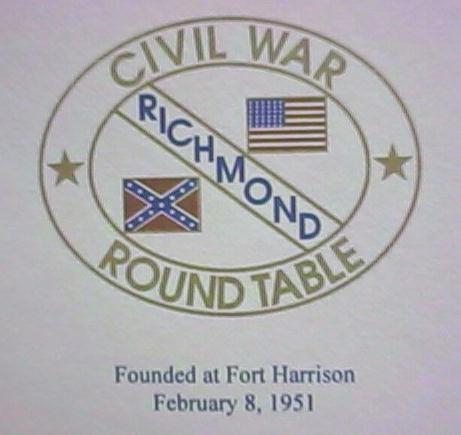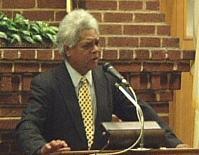


May 2002
Clark H. Lewis, President Art & Carol Bergeron, Editors P. O. Box 1122 3901 Paces Ferry Road Richmond, VA 23218 Chester, VA 23831-1239 May 2002 PROGRAM
Frank A. O'Reilly "The Last Days of Stonewall Jackson" 8:00 p.m., Tuesday, May 14, 2002, at the Boulevard United Methodist Church, 321 N. Boulevard, Richmond, VA (corner of Boulevard and Stuart Ave.) Frank A. O'Reilly graduated in 1987 with a Bachelor of Arts degree in American History from Washington & Lee University. He worked for the "Stonewall" Jackson House in Lexington and was a guest lecturer at Washington & Lee on Civil War topics while still an undergraduate. O'Reilly joined the National Park Service in 1987 as a temporary historian at the Fredericksburg & Spotsylvania National Military Park and later took a fulltime position at Independence Hall in Philadelphia. He returned to Fredericksburg in 1990 to fill the permanent historian's position at the "Stonewall" Jackson Shrine. O'Reilly has also served as an historical consultant for the City of Fredericksburg and the Shenandoah Valley Battlefield Planning Commission. O'Reilly has written numerous articles on the war in Virginia and introductions to several books, including Phil Sheridan's memoirs, the History of the 1st Massachusetts Cavalry, and the 155th Pennsylvania's Under the Maltese Cross. In 1993, he released a book on the Fredericksburg Campaign titled Stonewall Jackson at Fredericksburg, and he has contributed several articles and essays such publications as James M. McPherson's Atlas of the Civil War; Ted Savas' Civil War Regiments; and Bill Miller's Civil War magazine. O'Reilly has made appearances in several video documentaries, including "Civil War Journal." His latest book, The Fredericksburg Campaign: Winter War on the Rappahannock, will be released by Louisiana State University Press in the Fall of 2002. He is currently researching another book on the Battle of Chancellorsville. O'Reilly's presentation will deal with the wounding of Stonewall Jackson at the Battle of Chancellorsville and will follow through to his death and subsequent funeral.
Review of the April Program
 |
Announcements
Round Table Web Site For those members who have Internet access, the Round Table has a Web site that features the monthly newsletter, past newsletters, book reviews, and much more. The address is rcwrt.org
Cemetery Memorial Ceremony A monument and plaque will be dedicated in the Scottsville Confederate Cemetery on Saturday, May 25, at 2 p. m. They will honor the 40 Confederate soldiers who are believed to be buried there. All of the men died in the local Confederate hospital that operated from 1862-1863. Until now, the identity of these men has been unknown, and their graves were marked by simple marble headstones inscribed only with the letters "C V" (Confederate Veteran). The men were from seven different states, and the plaque lists their names and military units. This is a community event and is sponsored by the United Daughters of the Confederacy, the 19th Virginia Camp of the Sons of Confederate Veterans, and the Town of Scottsville. The famous Stonewall Band from Staunton will play at the ceremony. For more information, call Richard L. Nicholas in Charlottesville at (434) 977-1878 or contact him by e-mail at Richardnicholas@msn.com
Ukrops' Golden Gift Program Once again this year, we will be collecting Ukrops' receipts from its Golden Gift Program to benefit the Richmond Battlefields Association (RBA). Please remember to solicit these receipts from friends and co-workers who may otherwise not donate them to any particular organization. Your support of the RBA is greatly appreciated.
Museum of the Confederacy Programs Summer Living History begins May 25 and runs through September 2. The Museum is pleased to offer a variety of costumed historians each day through the summer for visitors to learn more about the daily life of soldiers and citizens in the South in the 19th century. The programs are free with Museum admission. Children's Fun Days will be held on May 27, Memorial Day. Families are encouraged to bring your kids to enjoy a fun day at the Museum on these holidays while learning about Civil war history. Children will enjoy a scavenger hunt or other neat activities that will put them on a journey through the Museum galleries and will receive a prize to take home at the completion of their mission. Free with Museum admission. Jefferson Davis' Birthday Celebration will be held on Monday, June 3. Help celebrate the Confederate President's birthday. Join us for punch, cake and special activities in the Museum throughout the day. Free with Museum admission.
RCWRT Monthly Speakers for 2002
Newsletter Deadlines To facilitate the printing and timely distribution of the monthly newsletter, information for it should be submitted to the editors no later than the following dates: May 24 for June; June 21 for July; July 19 for August; August 23 for September; September 20 for October; October 18 for November; and November 22 for December
Richmond Civil War Round Table Newsletter Art & Carol Bergeron, Editors 3901 Paces Ferry Road Chester, VA 23831-1239
Return to News Letters Index
Return to main page

©R.C.W.R.T. 2002